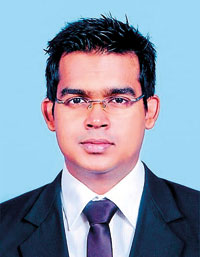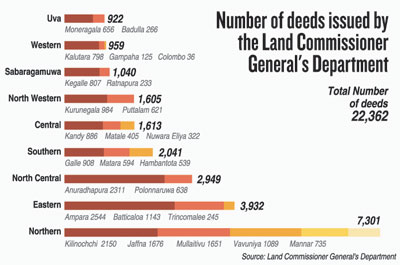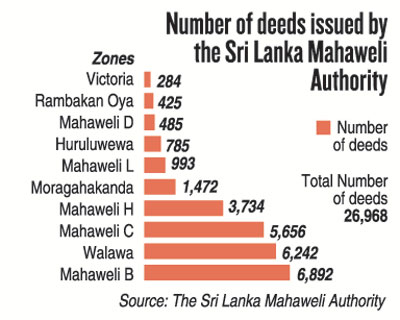News
Urumaya under review amidst protests from beneficiaries
View(s):By Ishu Bandara
The “Urumaya” national programme of the former Government is under review with a change of its name, structure and implementation set to take place.

Land & Irrigation Deputy Minister Susil Ranasinghe
Land & Irrigation Deputy Minister Susil Ranasinghe told the Sunday Times that he had personally consulted experts, including Provincial Secretaries, Land Commissioners, and grassroots-level land officers, both orally and in writing. According to their advice, it would be best to halt the process, as it does not follow the formal methodology and could have significant long-term impacts on land-related issues in the future.
“During the meeting with officials from the Land Commissioner General’s Department, they also expressed the view that this method of issuing deeds is not suitable. They recommended continuing with the conditional deed system with a maturity process, as was done previously,” he said
Under the previous government, “Urumaya” was launched as a major programme in Sri Lanka, aiming to grant freehold land rights to two million people and provide 50,000 individuals with full ownership of their homes. Minister Ranasinghe explained that under this program, freehold deeds are issued, granting land without any conditions.

Eshan Sandungahawatta
He raised concerns over the potential risks of this, noting that in Sri Lanka, paddy lands have a minimum division limit and cannot be subdivided into plots smaller than one acre due to irrigation concerns. However, the freehold deed issued through this programme removes that restriction, posing a threat to the country’s paddy lands.
“Additionally, with these unconditional freehold deeds, the deed owner has full control over the land and can sell it without consulting family members. Another concern is that anyone interested in purchasing land in a specific area can freely buy plots from individual deed owners, potentially acquiring large portions of land in the region. This could impact Sri Lanka’s land policy and disrupt the established methodology of land division”, said the Deputy Minister of Land and Irrigation Dr. Ranasinghe.
“Taking all these suggestions into account, we have already discussed the matter with the newly appointed Land Commissioner General and decided to appoint a committee of experts. This committee will evaluate the issue and determine whether the conditional deed or the unconditional deed is the most suitable approach. Based on their findings, the government will make a final decision on whether to continue the Urumaya program or continue with the previous conditional deed”, said the Deputy Minister.
“However, people are concerned about obtaining deeds for their land, and we are working to expedite the process while also digitizing land records. Additionally, we will soon provide a solution for the freehold deed issues. All already registered deeds will be issued following the expert committee’s decision, and in most cases, landowners will receive their deeds under the previous scheme rather than through the Urumaya programme,” he said.

The Land Commissioner General’s Department and the Sri Lanka Mahaweli Authority are both moving forward with the issuance of Urumaya deeds. To date, the Land Commissioner General’s Department has issued 22,362 deeds, and the Sri Lanka Mahaweli Authority has granted 26,968 deeds. In total, 49,330 individuals have been facilitated with deeds under the Urumaya program, which was initiated by the previous government of Sri Lanka.
When the Sunday Times inquired about this matter, the Commissioner General of Lands, R. A. Chandana Saman Ranaweera Arachchi, who was appointed on January 24, 2025, stated, “We are planning to get the decision on the Urumaya programme after establishing the Expert Committee, which will likely happen next week. Until then, we have stopped issuing Urumaya deeds for those already registered, as we need the president’s approval.”

However, a landowner from Yakkala, Gampaha District Channa Perera, who received a deed under the Urumaya programme, shared his views with the Sunday Times.
“Our house and land, which spans 38 perches, originally had a ‘Swarnabhoomi’ deed. Later, we obtained a deed under the Urumaya programme. The property is owned by my mother, Lalitha Ranjani, and we have lived here for over 25 years. The Urumaya deed system is very effective because, under the Swarnabhoomi deed, we couldn’t sell the land or house, as it couldn’t be divided or legally transferred. Now, with the Urumaya deed, we finally have full ownership rights.
“Government officials should not have the power to control our land like in feudal times. Now, since our mother lives alone in the house, we have the freedom to decide, we can either bring her to live with us or sell the property for our benefit. With these deeds, no one has to live in servitude to the government anymore,” said Mr. Perera.
“We have many examples of people who have improved their lives using the Urumaya deed for their success in our area. People should not have to kneel before government officials if they can rightfully own their land with their own deed,” he added.
Attorney-at-law Eshan Sandungahawatta told the Sunday Times “According to the 2024 budget proposal, the government’s intention is clear to provide unconditional freehold ownership of lands allocated to farmers and low-income earners. To achieve this, the programme must align with the Land Development Ordinance of 1931. This means that only individuals who fall under these two categories are eligible for the Urumaya programme. Those who do not meet these criteria cannot apply. Under the Urumaya deed, landowners have the freedom to develop, partition, sell, or mortgage their lands.”
He further added “Under the Land Development Ordinance No. 19 of 1935, the privileged beneficiaries have traditionally been farmers and low-income individuals. The Urumaya programme, as initiated, primarily focuses on enhancing land value and empowering these groups by giving them full control over their land, which could potentially boost the local economy.
“However, in practice, there are many loopholes in the Urumaya programme, and that’s why the current government is considering a review,” Mr. Sandungahawatta told the Sunday Times.
The best way to say that you found the home of your dreams is by finding it on Hitad.lk. We have listings for apartments for sale or rent in Sri Lanka, no matter what locale you're looking for! Whether you live in Colombo, Galle, Kandy, Matara, Jaffna and more - we've got them all!

